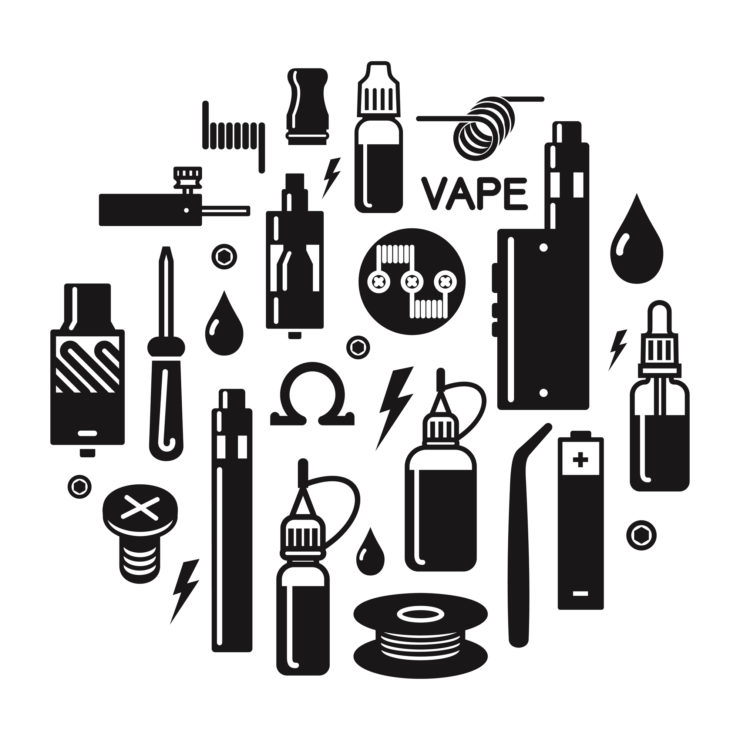
Like so many other U.S. industries, the U.S. vaping industry is now in the crosshairs of a 25% tariff on products imported from China. The first two waves of President Trump’s proposed tariffs against China covered about $50 billion worth of Chinese products but they did not include any vaping products. After China retaliated and proposed its own equivalent tariffs on an estimated $50 billion worth of U.S. products imported into China, President Trump proposed a much bigger third list of China products to cover an additional $200 billion in imports from China. This third list targets vaping devices, vaping parts, and batteries from China. Because our law firm’s marijuana business lawyers represent so many companies involved in various aspects of the vaping industry, we are hearing a earful about how these tariffs will “decimate” the nascent industry.
The U.S. vaping industry is indeed particularly exposed to these tariffs. Though much of the e-liquid used for vaping is made in the United States, almost all of the vaping hardware is imported from China. Just as Gillette makes the most money selling razor cartridges and not razors, many U.S. vaping companies chose to focus on the higher margin e-liquids, rather than lower margin vaping devices. Some have noted that there are no U.S. companies that produce any vaping hardware products. We are hearing of how many vape and cannabis retail shops will be unwilling or unable to pay the extra 25% tariffs because they do not believe they will be able to pass these extra costs on to their customers. If this does prove true, the vaping industry will indeed be decimated.
Fortunately, there is still time for vaping companies to seek a tariff exemption for certain vaping products. The U.S. Trade Representative will accept comments until September 6 on whether entire categories of products listed on the third wave of proposed tariffs — the $200 billion in imports from China — should be exempted. There likely will be yet another chance to make more product-specific exclusion requests later in the fall.
For an exclusion request to have any realistic chance at being granted, marijuana and related vaping companies should address the following factors:
- A description of the physical characteristics (dimensions, material composition, etc.) of the particular vaping products and the 10 digit subheading of the HTSUS tariff category applicable to those products.
- Whether the particular vaping product is available only from China. In addressing this factor, requesters should address specifically whether the particular vaping product and/or a comparable product is available from sources in the United States and/or in third countries.
- Whether imposition of additional duties on the particular vaping product would cause severe economic harm to the requester or other U.S. interests.
- Whether the particular vaping product is strategically important or related to “Made in China 2025” or other Chinese industrial programs.
- Requesters must provide the annual quantity and value of the Chinese-origin product the requester purchased in each of the last three years. If precise annual quantity and value information are not available, USTR will accept an estimate with justification.
- Requesters may also provide any other information or data they consider relevant to evaluating their request.
The process for reviewing and deciding on these exclusion requests will not result in any immediate decision but the hope is that a favorable decision eventually will allow for refunding the tariffs paid.
The goal is to have the USTR review the comments and grant exclusions, particularly for products that are not made in the United States and can only be sourced from China. The last time similar tariffs were applied on steel products back in the early 2000s, many exclusions were granted that helped ease the impact of the tariffs on downstream users.
There have already been many opposing comments and exclusion requests submitted for the first two waves of proposed China tariffs. Many of the opposing comments have noted how the proposed tariffs on the Chinese products have nothing to do with Chinese practices of stealing or extorting intellectual property from U.S companies, which are the reasons claimed for invoking the China tariffs in the first place. Many have also objected to how these tariffs are not likely to change how China respects intellectual property rights, but will have a catastrophic effect on certain American companies. What was a booming U.S. vaping industry now faces going bust with the proposed tariffs. If you are in the vaping industry, now is the time to do what you can to prevent this.
Editor’s Note: A version of this post previously appeared on our law firm’s China Law Blog. It focuses on the vaping industry but much of it holds true for a host of other U.S. industries caught up in the tariffs as well. The bottom line is that the situation for products and companies that will be hurt by these tariffs is not good and the chances of overturning the tariffs are in most cases less than 50 percent. But in many cases the situation is not yet hopeless and it behooves you to try.























